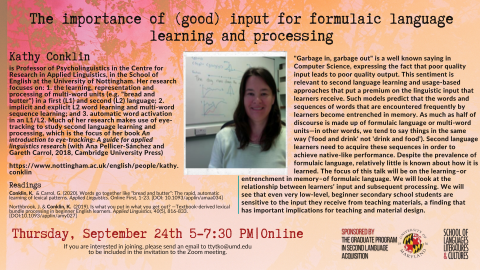SLA Invited lecture: Kathryn Conklin

SLA Invited lecture: Kathryn Conklin
College of Arts and Humanities | School of Languages, Literatures, and Cultures | Second Language Acquisition
Thursday, September 24, 2020
5:00 pm - 7:30 pm
, Online - Zoom
Invited lecture: Kathryn Conklin (The University of Nottingham)
The importance of (good) input for formulaic language learning and processing
"Garbage in, garbage out" is a well known saying in Computer Science, expressing
the fact that poor quality input leads to poor quality output. This sentiment is
relevant to second language learning and usage-based approaches that put a
premium on the linguistic input that learners receive. Such models predict that the
words and sequences of words that are encountered frequently by learners become
entrenched in memory. As much as half of discourse is made up of formulaic
language or multi-word units—in other words, we tend to say things in the same
way (food and drink not drink and food).
Second language learners need to acquire these sequences in order to achieve native-like performance. Despite the prevalence of formulaic language, relatively little is known about how it is learned. The focus of this talk will be on the learning–or entrenchment in memory–of formulaic language. We will look at the relationship between learners’ input and subsequent processing. We will see that even very low-level, beginner secondary school students are sensitive to the input they receive from teaching materials, a finding that has important implications for teaching and material design.
Second language learners need to acquire these sequences in order to achieve native-like performance. Despite the prevalence of formulaic language, relatively little is known about how it is learned. The focus of this talk will be on the learning–or entrenchment in memory–of formulaic language. We will look at the relationship between learners’ input and subsequent processing. We will see that even very low-level, beginner secondary school students are sensitive to the input they receive from teaching materials, a finding that has important implications for teaching and material design.

